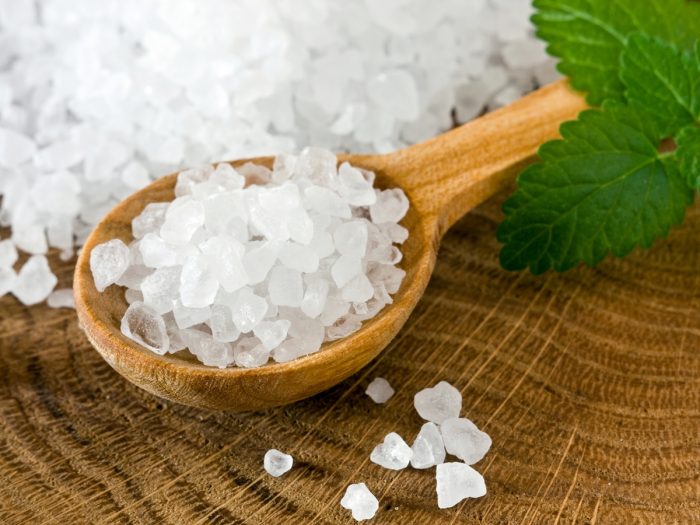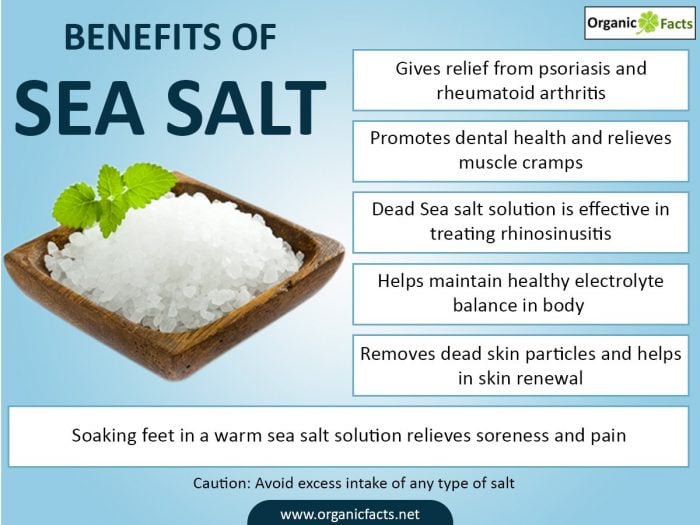Sea salt may be commonly associated with spa days and relaxation. Good news for us, there are many health benefits associated with sea salt. They may include skincare, improved dental health, and relief from pain and cramps. Furthermore, it might be beneficial for exfoliation, nasal and eye wash, and an improved electrolytic balance of the body.
What is Sea Salt?
Sea salt, also known as bay salt, is produced by the process of evaporation of salt water bodies. It may be darker in color as compared with refined salt due to the absorption of essential minerals from the clay lining of the body of water. Normally, the harvesting of refined table salt may involve heavy processing, including mining followed by iodizing, bleaching, and diluting the salt with anti-caking agents. More chemicals are added during the processing of salt, which often steals all of its beneficial minerals and trace elements, except sodium and chloride.
Unlike refined salts, the preparation of sea salt may usually include very little processing, so it retains its moisture and mineral treasure. These minerals are present in a form that is easily utilized and absorbed by the human body. The climate and the geographical location of the region may also play a significant role in the quality and combination of minerals offered by sea salt. [1]
The Mediterranean Sea, the Atlantic Ocean, and the North Sea are the most common hubs for harvesting sea salt. The method involved in harvesting may also help retain its natural state and therapeutic qualities. In ancient times, sea salt was valuable for healing hand injuries and wounds of fishermen. [2]
Celtic sea salt is harvested differently from traditional sea salt and uses conventional Celtic methods. These methods may involve working and collecting the salt entirely by hand, using only wooden tools. It does not contain harmful chemicals or additives that are usually added to refined salt to prevent it from clumping.
Nutritional Value of Sea Salt
Sea salt potentially derives 82 essential trace nutrients from the mineral treasure trove present in seawater, according to the Journal of Aquaculture and Aquatic Sciences. These natural minerals are valuable for the healthy functioning of the body. The nutritional wealth of sea salt may include vital minerals like sodium, potassium, calcium, magnesium, bromide, chloride, iron, copper, and zinc, among other beneficial elements. [3] [4]
Health Benefits of Sea Salt
Sea salt may consist of a similar assortment of minerals and natural healing elements as those found on skin cells. Therefore, it is often used as a perfect ingredient to be used for therapeutic treatments and beauty products.

A spoonful of sea salt Photo Credit: Shutterstock
May Aid In Skin Care
The mineral content in Dead Sea salt has long been appreciated for its rejuvenating effects on the skin. Bathing in sea salt solution may help in keeping the skin moisturized and revitalized. Dead Sea salt baths may also help in improving the skin barrier function and eliminating the roughness and inflammation on the skin’s surface.
Research published in the International Journal of Dermatology has shown that this anti-inflammatory effect may be attributed to the presence of a high content of magnesium in these salts. It may also help in the detoxification of the body by flushing out toxins from the pores, while also aiding in improving circulation. [5]
May Improve Oral Health
Sea salt may contain fluoride, which is beneficial for promoting dental health. Fluoride may aid in protecting the teeth from acidic damage and prevent the development of caries and cavities. Regular rinsing and gargling with tepid sea salt water may help alleviate mouth sores, bleeding gums, ulcers, and the pain of sore throats. While fluoride is now added to the water in many countries around the world, sea salt may have been particularly important in the early 20th century, when many some countries did not have access to it this way. [6]
May Provide Relief From Rheumatoid Arthritis
Dead Sea salts have been proven to be effective in providing therapeutic relief to patients suffering from rheumatoid arthritis. One study showed that participants in baths containing these salts demonstrated significant improvements in such ailments as compared to normal sodium chloride baths. These results may be promising for an effective, natural method for providing relief in this population. [7] [8]
May Encourage Exfoliation
Sea salt may find another use in the cosmetic industry in the manufacturing of scrubs and other skin care products like antiperspirants and deodorants. Exfoliation with sea salts may help remove dead skin particles, tone up the skin tissues, encourage peripheral blood circulation, and also promote skin renewal. Unlike table salt, the granular texture of sea salt may work very well in providing clean and smooth skin.
May Relieve Symptoms of Psoriasis
Sea salt may be considered to be a natural remedy useful for the treatment of psoriasis, along with the appropriate medication. Use of sea salt has shown noteworthy improvements in patients who may have been suffering from skin conditions like itching and scaling. The efficacy of balneotherapy, which is done using a sea salt treatment with mudpacks and sulfur baths on those suffering from psoriasis and psoriatic arthritis may have also demonstrated promising results with respect to a reduction in spinal pain and increased flexibility of the spine. [9] [10]
May Improve Pain in Osteoarthritis
One small study demonstrated improvements in patients possibly suffering from knee osteoarthritis after treatment using balneotherapy with Dead Sea salt. In addition to this, some patients might have been able to sustain their improved health parameters even after a few weeks, unlike those who took the bath treatment with normal sodium chloride. [11]
May Prevent/Cure Rhinosinusitis
Research studies have proven that the Dead Sea salt solution may also be effective in providing relief from rhinosinusitis. The study also concluded that nasal irrigation and sprays done with sea salt may have showed better symptomatic relief as compared to those made of hypertonic saline solution. The anti-inflammatory effects of Dead Sea salts may make them a natural and healthy alternative for relieving nasal allergies and other respiratory disorders; other remedies, such as nasal steroids have side effects like inflammation that can lead to mucus secretion. The mineral content present in Dead Sea salt may help alleviate swelling and congestion, as well. [12] [13] [14]
May Help Maintain Electrolyte Balance
Sea salt may help in maintaining a healthy electrolyte balance in the body, which is necessary for maintaining optimum blood composition and circulation, muscular strength, and overall functioning of the body. Minerals like potassium, calcium, magnesium, and sodium may contribute to the electrolytic equilibrium of the body. Sea salt may aid in maintaining healthy levels of blood pressure and helps normalize irregular heartbeats. [15]
May Give Relief from Acne
Sea salts may contain sulfur, which might help in cleansing and treating skin conditions like dermatitis and acne scars.
May Relax Aching Feet
Soaking your tired feet in a warm sea salt solution may help relax the muscles, and relieve the soreness and pain in your aching feet.
May Encourage Restful Sleep
Many consider that sea salt baths may have a calming and soporific effect, thus helping in inducing profound and rejuvenating sleep.

Sea salt is helpful in making a foot soak. Photo Credit: Shutterstock
May Offer Possible Relief from Muscle Cramps
Sea salt is thought to be beneficial in relieving muscle cramps by many. While the need for the salt to help relieving cramp is considered a myth in the science world, why it happens is still unexplained. It is possible that essential minerals, like magnesium and potassium, may have therapeutic and rejuvenating qualities, thus making sea salts a natural remedy to cure aches and pains. Even if it is not proven, many find that sea salt may help in easing any stiffness and discomfort caused by muscle fatigue and tension.
May Help In Eye Care
A sea salt solution may be considered an effective homemade remedy for relieving puffiness around your tired eyes. A sea salt compress might aid in reducing the dark circles and sagging bags under the eyes, while inducing a calming, stress-relieving effect.
May Reduce Acidity
Sea salt is thought to help in alkalizing the cells of the body by facilitating the excretion of excess acids through urination. According to many who follow the alkaline diet, this may help in maintaining the optimal acid-alkali ratio of the body. While there is much more research on this topic to be conducted, some research reviews suggest that there may be some validity in following an alkaline diet to reduce morbidity in the future. [16]
Culinary Uses
Sea salt is also valued for its distinct flavor and is added to various recipes across all cultures, particularly in French and Thai cuisine.
While it is delicious to eat, sea salt should be consumed in appropriate quantities. Irrespective of the type of salt, excessive intake of one type of salt may lead to many health ailments, like edema or high blood pressure, which can pose a risk for other medical conditions. [17]
